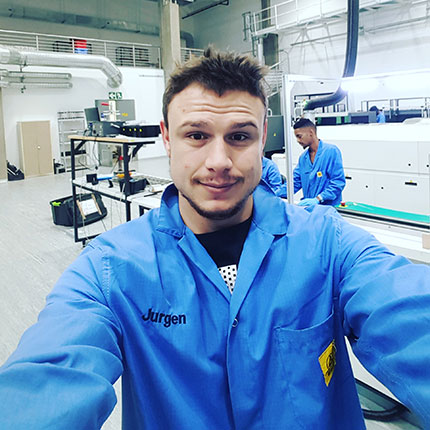Wits students showcase South African electronics research at top international workshop
- Wits University
ACES 2020 ATLAS CMS Electronics is the state-of-the-art international electronics conference for Large Hadron Collider LHC upgrades at CERN.
Three students from Wits University’s High-throughput Electronics Laboratory within the Institute for Collider Particle Physics (ICPP) recently showcased South African electronics research at the world-class international conference called ACES 2020.
 ACES 2020 (ATLAS CMS Electronics) is the state-of-the-art international electronics conference for Large Hadron Collider (LHC) upgrades at the European Laboratory for Particle Physics (CERN), where the LHC – the world’s largest and most powerful particle accelerator – is housed.
ACES 2020 (ATLAS CMS Electronics) is the state-of-the-art international electronics conference for Large Hadron Collider (LHC) upgrades at the European Laboratory for Particle Physics (CERN), where the LHC – the world’s largest and most powerful particle accelerator – is housed.
The conference was scheduled to take place at CERN on March 17, 2020 – March 19, 2020. Due to the safety restrictions linked to the COVID-19 virus spread, the scheduled dates was postponed to May 26, 2020 – May 28, 2020. Despite these challenges, the three students from Wits University continued to work during the pandemic period to present their work to the conference.
The ACES conference is dedicated to electronic issues for upgrades, focusing on subjects where common features or developments are taking place. The three Wits students are doing their research work for the upgrade of the Tile Calorimeter of the ATLAS Detector at CERN.
 Edward Nkadimeng (PhD) and Ryan McKenzie (MSc) presented their work about the reliability testing and the upgrade of Low Voltage Power Supplies (LVPS), which is used to power the future on-detector electronics of the Tile Hadronic Calorimeter.
Edward Nkadimeng (PhD) and Ryan McKenzie (MSc) presented their work about the reliability testing and the upgrade of Low Voltage Power Supplies (LVPS), which is used to power the future on-detector electronics of the Tile Hadronic Calorimeter.
“We present two test-station designs for testing the latest version of a switch-mode power supply for the front-end electronics of the ATLAS TileCal,” says Nkadimeng.
“The new test station significantly improves fault detection and reliability. We further discuss the steps taken to test the new Tile-LVPS, using a custom-based software to perform tests and graphically display and record all performance metrics.”
Ryan McKenzie says these bricks function to step-down bulk 200V DC current to the 10V DC current required by the front-end electronics of a TileCal module and are exposed to high levels of radiation as well as a strong magnetic field due to the operating environment within the ATLAS detector.
 Mpho Gift Doctor Gololo (PhD) presented about the Tile PreProcessor (Tile PPr) for the Phase-II Upgrade of the readout electronics, which is part of the off-detector electronics of the Tile Hadronic Calorimeter and it is used to process data at a throughput of 40 Tbps.
Mpho Gift Doctor Gololo (PhD) presented about the Tile PreProcessor (Tile PPr) for the Phase-II Upgrade of the readout electronics, which is part of the off-detector electronics of the Tile Hadronic Calorimeter and it is used to process data at a throughput of 40 Tbps.
“The Tile Computer on Module (TileCoM) mezzanine board is an FPGA board that is used to remotely configure the on and off-detector electronics as well as to interface ATLAS DCS data to the Tile PreProcessor. This contribution presents the deployment of an embedded Linux, development of firmware and software on the ZYNQ System-on-Chip (SoC),” says Gololo.
“We are proud that our students were able to continue performing at the highest, world-class level, during these trying times,” says Professor Bruce Mellado, Director of the ICPP.
The SA-CERN program is supported by the Department of Science and Innovation and it is hosted by iThemba LABS of the National Research Foundation.

